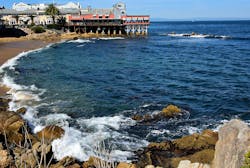EPA settles with American Cooling Inc. on unauthorized industrial stormwater discharges
SAN FRANCISCO, CA, NOV 14, 2018 -- The U.S. Environmental Protection Agency (EPA) reached a settlement with American Cooling, Inc. over Clean Water Act violations at its refrigerated warehouse and storage facility in Salinas, Calif. The agreement requires the company to pay a $28,900 penalty to resolve violations associated with unauthorized stormwater and wastewater discharges between August 2013 and June 2018.
"Pollutants in industrial stormwater runoff can harm local water bodies," said EPA Pacific Southwest Regional Administrator Mike Stoker. "EPA is committed to protecting our water resources, such as Monterey Bay and the Salinas River, which provide critical habitat for endangered species and support a wide range of recreational activities."
EPA inspected American Cooling's SEMCO facility in November 2016 and found the company did not have a stormwater discharge permit from the California State Water Resources Control Board. Stormwater runoff from American Cooling's Salinas facility discharges into Alisal Creek, a tributary to the Salinas River, which flows into Monterey Bay.
EPA also found the facility was discharging industrial wastewater into the City of Salinas municipal storm sewer system, rather than the Monterey One Wastewater Treatment Plant, due to improper operation of a system of storm drain plugs and valves intended to control these discharges. In addition, the facility was operating without a stormwater pollution prevention plan, which details standard operating procedures designed to reduce or eliminate pollutants in stormwater runoff. The company has since obtained the necessary permit, developed an adequate stormwater pollution prevention plan, and has come into compliance with Clean Water Act requirements.
Background
Pollutants from industrial facilities, if not properly managed, can damage water quality and aquatic life. Stormwater runoff associated with refrigerated cooling activities can include total suspended solids, oil and grease, salts, elevated pH and organic wastes. The CWA requires that certain industrial facilities obtain National Pollutant Discharge Elimination System permits to control the discharge of pollutants in stormwater runoff into nearby water bodies. These facilities must develop and implement stormwater pollution prevention plans to prevent runoff from washing harmful pollutants into local water bodies.
